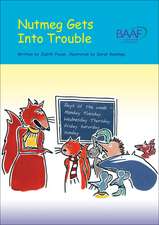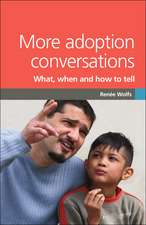Plan B: Empowering the Single Parent . . . to Benefit Their Child with Autism
Autor Karra Barber-Wadaen Limba Engleză Paperback – 15 apr 2013
If, like many parents of children with autism, you are tackling the job of raising your child on your own, Plan B: Parenting Solo With a Child on the Autism Spectrum is the resource you need. Plan B will help you to make your own road map towards thriving while you solo parent. How will you explain divorce, separation or death to your child with autism? How can you maintain consistency across two households? How can you adjust your budget and therapy schedule? What resources will you need? How can you build a new network of support? Plan B can help! With interactive lists to help you to create your own emotional, practical and actual Plan B, this book is the resource that every solo parent of a child with autism needs. Each child's journey towards adulthood and independence is unique. As each concept is presented, worksheets are provided for practical application of the solid advice that will help you and your child to thrive. If you are a single parent helping your child with autism on that journey, Plan B will help you to identify and tackle the unique challenges that you face.
Preț: 81.23 lei
Nou
Puncte Express: 122
Preț estimativ în valută:
15.54€ • 16.27$ • 12.94£
15.54€ • 16.27$ • 12.94£
Carte disponibilă
Livrare economică 10-24 martie
Preluare comenzi: 021 569.72.76
Specificații
ISBN-13: 9781935274797
ISBN-10: 1935274791
Pagini: 200
Dimensiuni: 127 x 178 x 15 mm
Greutate: 0.23 kg
Editura: FUTURE HORIZONS
ISBN-10: 1935274791
Pagini: 200
Dimensiuni: 127 x 178 x 15 mm
Greutate: 0.23 kg
Editura: FUTURE HORIZONS
Notă biografică
Karra Barber-Wada raised her son, who has Asperger's Syndrome, as a single parent. She is the founder and facilitator of a well-established support group for parents of children and teens on the autism spectrum. Barber-Wada is the author of Living Your Best Life with Asperger's Syndrome and The Social And Life Skills Menu: A Skill Building Workbook for Adolescents with Autism Spectrum Disorders, is a regular contributor to many autism magazines.
Extras
From the Foreword:
Today I discovered my son asleep in his chair, behind his desk. He was slumped over, his glasses resting crookedly on his face. Nearby, I found his laptop open and still humming. Good grief, I thought. I glanced at the clock over his bed. It was 1 AM! How long was he studying? I wondered. As I scanned his room, I noticed a number of balled-up pieces of paper in the trash canby his desk. I picked one up and flattened it out against the desktop. On it was a half-written essay about the comparison between good and evil. His SAT practice book was cracked open to a page on which he had highlighted test questions. What is an auxiliary? What is the perfect participle? What is a hypothesis? There was a collection of vocabulary flash cards scattered across his desk. He must have wanted to review the materials one last time before taking his SAT exam in the morning. He’s come a long way, I told myself. And so have I.
My son Thomas has Asperger’s syndrome. As a toddler, he had limited language skills, obvious processing difficulties, and complex social challenges. Today, you would never know that Thomas understands the concept of a “Plan B” and uses it as a coping mechanism. At age 17, Thomas is a senior at a college preparatory high school. He is awaiting his SAT results and looking forward to touring colleges and planning for his future. I’m proud of his personal achievements, just as I’m proud to have prepared both him and myself for the unanticipated situations that arise in life. Having been a single parent for the past 13 years, I’ve been able to observe Thomas’ progress and reflect on my journey with him and the steps we’ve taken together. Most were wonderful, some were painful, but all have been survivable. Raising Thomas as a single parent has been one of the most difficult and rewarding experiences in my life. Despite the numerous challenges we’ve endured over the years, I am thankful to have learned a lot about myself. Most profoundly, I have learned about my resilience as an individual, my commitment as a parent, and my determination as a child advocate. Raising a child on the autism spectrum by myself has provided me with the opportunity to recognize when and how to implement a “Plan B.”
When circumstances change unexpectedly in everyday life, having the ability to develop and/or accept a different plan of action (a “Plan B”) is essential. Thomas and I know this firsthand. In this book, although I share a few details with you about my life to give you a frame of reference and to illustrate the progress I’ve made as a single parent of a child with Asperger’s, my goal is to share relevant information. I hope to inspire you, so that you too can devise your own “Plan B” if you’ve determined that your “Plan A” isn’t working out as you’d planned.
From the Section on Moving Forward:
Maintain Consistency in Your Child’s Daily Activities, Routines, and Schedules
As often as possible, provide consistency regarding your child’s routines, activities, and daily schedules. It’s important for your child to rely on his daily routine with as much regularity as possible. With so much of his family life altered because of your marital or relationship change, the least amount of
disruption is best. Your child may fall apart, overreact, and/or behave in a manner that is unexpected or inappropriate at the slightest change in his routine. Remember to be patient and understanding with him. His life will be different, and the changes will be new. He too needs time to adjust to his new circumstances. The unknown can be frightening—perhaps even terrifying at times—and your child’s actions may be reflected in his conduct at school and/or at home. Be tolerant! For example, many children with autism can literally erupt at the slightest change in their everyday routines. When there is a divorce, add to the mix a new home environment, having to move back and forth between parents throughout the week and weekends, and learning the expectations (and there will be new ones) from each parent.
Think about it. Your child will have to navigate new surroundings, new expectations, and the adjustments that go along with having single parents in separate homes. Holidays, birthdays, every day will be different than it was before. This is huge for your child! For some children with autism, it can take days even weeks to recover from the smallest disruption in their routine. Things like having similar toys, books and furnishings in both homes can help, but your child may even reject those things because they are not the same. Now add to the mix having to adhere to a standard visitation schedule. It’s new, different, and ever changing. And for a child who has transition challenges, this can be extremely difficult to adjust to. Allowing your child time to acclimate themselves to their new circumstances takes time and understanding. Be patient. It’s a process.
Tip: Maintain consistency for your child at home after your divorce. For example, if dinnertime has always been at 6 o’clock and you always read a story before bed, try and abide by these same routines. Maintaining the same structure in a new situation helps with continuity in your child’s life at a time when everything else is changing.
Inform Your Children’s School, Doctors, and Service Providers about Your Recent Changes.
It is difficult to predict how your child may react to thchange in your family unit. Emotions and attitudes may be heightened, and, as a result, your child’s basic conduct may be uncharacteristically different. Thus, providing pertinent information that can be useful to those who relate to and work with your child on a regular basis may be helpful. Given the opportunity, children will often prefer to discuss their feelings about personal family issues with non–family members whom they have a bond with, such as a psychologist, teacher, counselor, or behaviorist. Many of these professionals may have established a history with your child and are likely to provide them with the appropriate counsel, guidance, and understanding they need. It’s important to encourage your child to express his feelings to whomever he’s most comfortable with. Conversely, despite the change in your family unit, your child may react by not reacting at all. This behavior should also be addressed appropriately and with the proper professionals.
Sharing is important: Kyla’s story
Kyla’s parents would describe her as a blue eyed, bubbly, bright and chatty little ten year old with long dark hair. Even though she’d been diagnosed with Asperger’s when she was nine, Kyla was
uncharacteristically sociable. Her teachers would say she was outgoing and friendly. However, when her parents announced their divorce unexpectedly, Kyla was devastated. Her disposition seemed to have changed overnight, and suddenly, she had nothing to say (to her parents, anyway). If her mother asked about her day at school, she gave one word answers. When her father spent time with her on the weekends, she was sullen and reclusive. Worried, Kyla’s parents asked her teachers to keep an eye on her at school. One teacher, Mrs. Green, Kyla’s math teacher, noticed her at recess and during the lunch period. She’d often find her sitting alone or aimlessly walking the perimeter of the playground. Concerned, Mrs. Green asked if she could join Kyla for lunch one day. Reluctantly, Kyla agreed. One day became two, then three and soon Kyla welcomed the company. Eventually Kyla opened up and shared with Mrs. Green her anxiety about her parent’s divorce. She explained how fearful she was about her new situation. She told how her dad had a new apartment and her new bedroom was a LOFT - not even a bedroom with a door. She also shared how her mom had to return to work to pay the bills, and because of it Kyla had to go to the neighbor’s house after school until her mom got home from work. Everything had changed. Where she lived, what time she had dinner, where she did her homework, and when she went to bed. Nothing was the same and it was too much for Kyla to handle.
Note: Ultimately this information was shared with Kyla’s parents and adjustments were immediately made (with Kyla’s input) to help eliminate Kyla’s anxiety due to all of the transitional changes.
Tip: Convey your current family circumstances (in writing or in person) to the people and professionals that interact with your special-needs child regularly. Ask them to report to you and/or your ex regarding any relevant physical, emotional, behavioral, and/or psychological changes involving your child as a result of your changing family situation.
What Are Your Actual Steps Forward?
Write down the actual steps forward that will help you focus primarily on your child, his or her special needs, and the structure your child will need to ensure continued growth and development during this process.
Practical Steps
For families who have a child on the autism spectrum, divorce becomes exceedingly more challenging. Children’s emotional states are altered, their treatment programs are affected, and their everyday routines become more unpredictable.
Today I discovered my son asleep in his chair, behind his desk. He was slumped over, his glasses resting crookedly on his face. Nearby, I found his laptop open and still humming. Good grief, I thought. I glanced at the clock over his bed. It was 1 AM! How long was he studying? I wondered. As I scanned his room, I noticed a number of balled-up pieces of paper in the trash canby his desk. I picked one up and flattened it out against the desktop. On it was a half-written essay about the comparison between good and evil. His SAT practice book was cracked open to a page on which he had highlighted test questions. What is an auxiliary? What is the perfect participle? What is a hypothesis? There was a collection of vocabulary flash cards scattered across his desk. He must have wanted to review the materials one last time before taking his SAT exam in the morning. He’s come a long way, I told myself. And so have I.
My son Thomas has Asperger’s syndrome. As a toddler, he had limited language skills, obvious processing difficulties, and complex social challenges. Today, you would never know that Thomas understands the concept of a “Plan B” and uses it as a coping mechanism. At age 17, Thomas is a senior at a college preparatory high school. He is awaiting his SAT results and looking forward to touring colleges and planning for his future. I’m proud of his personal achievements, just as I’m proud to have prepared both him and myself for the unanticipated situations that arise in life. Having been a single parent for the past 13 years, I’ve been able to observe Thomas’ progress and reflect on my journey with him and the steps we’ve taken together. Most were wonderful, some were painful, but all have been survivable. Raising Thomas as a single parent has been one of the most difficult and rewarding experiences in my life. Despite the numerous challenges we’ve endured over the years, I am thankful to have learned a lot about myself. Most profoundly, I have learned about my resilience as an individual, my commitment as a parent, and my determination as a child advocate. Raising a child on the autism spectrum by myself has provided me with the opportunity to recognize when and how to implement a “Plan B.”
When circumstances change unexpectedly in everyday life, having the ability to develop and/or accept a different plan of action (a “Plan B”) is essential. Thomas and I know this firsthand. In this book, although I share a few details with you about my life to give you a frame of reference and to illustrate the progress I’ve made as a single parent of a child with Asperger’s, my goal is to share relevant information. I hope to inspire you, so that you too can devise your own “Plan B” if you’ve determined that your “Plan A” isn’t working out as you’d planned.
From the Section on Moving Forward:
Maintain Consistency in Your Child’s Daily Activities, Routines, and Schedules
As often as possible, provide consistency regarding your child’s routines, activities, and daily schedules. It’s important for your child to rely on his daily routine with as much regularity as possible. With so much of his family life altered because of your marital or relationship change, the least amount of
disruption is best. Your child may fall apart, overreact, and/or behave in a manner that is unexpected or inappropriate at the slightest change in his routine. Remember to be patient and understanding with him. His life will be different, and the changes will be new. He too needs time to adjust to his new circumstances. The unknown can be frightening—perhaps even terrifying at times—and your child’s actions may be reflected in his conduct at school and/or at home. Be tolerant! For example, many children with autism can literally erupt at the slightest change in their everyday routines. When there is a divorce, add to the mix a new home environment, having to move back and forth between parents throughout the week and weekends, and learning the expectations (and there will be new ones) from each parent.
Think about it. Your child will have to navigate new surroundings, new expectations, and the adjustments that go along with having single parents in separate homes. Holidays, birthdays, every day will be different than it was before. This is huge for your child! For some children with autism, it can take days even weeks to recover from the smallest disruption in their routine. Things like having similar toys, books and furnishings in both homes can help, but your child may even reject those things because they are not the same. Now add to the mix having to adhere to a standard visitation schedule. It’s new, different, and ever changing. And for a child who has transition challenges, this can be extremely difficult to adjust to. Allowing your child time to acclimate themselves to their new circumstances takes time and understanding. Be patient. It’s a process.
Tip: Maintain consistency for your child at home after your divorce. For example, if dinnertime has always been at 6 o’clock and you always read a story before bed, try and abide by these same routines. Maintaining the same structure in a new situation helps with continuity in your child’s life at a time when everything else is changing.
Inform Your Children’s School, Doctors, and Service Providers about Your Recent Changes.
It is difficult to predict how your child may react to thchange in your family unit. Emotions and attitudes may be heightened, and, as a result, your child’s basic conduct may be uncharacteristically different. Thus, providing pertinent information that can be useful to those who relate to and work with your child on a regular basis may be helpful. Given the opportunity, children will often prefer to discuss their feelings about personal family issues with non–family members whom they have a bond with, such as a psychologist, teacher, counselor, or behaviorist. Many of these professionals may have established a history with your child and are likely to provide them with the appropriate counsel, guidance, and understanding they need. It’s important to encourage your child to express his feelings to whomever he’s most comfortable with. Conversely, despite the change in your family unit, your child may react by not reacting at all. This behavior should also be addressed appropriately and with the proper professionals.
Sharing is important: Kyla’s story
Kyla’s parents would describe her as a blue eyed, bubbly, bright and chatty little ten year old with long dark hair. Even though she’d been diagnosed with Asperger’s when she was nine, Kyla was
uncharacteristically sociable. Her teachers would say she was outgoing and friendly. However, when her parents announced their divorce unexpectedly, Kyla was devastated. Her disposition seemed to have changed overnight, and suddenly, she had nothing to say (to her parents, anyway). If her mother asked about her day at school, she gave one word answers. When her father spent time with her on the weekends, she was sullen and reclusive. Worried, Kyla’s parents asked her teachers to keep an eye on her at school. One teacher, Mrs. Green, Kyla’s math teacher, noticed her at recess and during the lunch period. She’d often find her sitting alone or aimlessly walking the perimeter of the playground. Concerned, Mrs. Green asked if she could join Kyla for lunch one day. Reluctantly, Kyla agreed. One day became two, then three and soon Kyla welcomed the company. Eventually Kyla opened up and shared with Mrs. Green her anxiety about her parent’s divorce. She explained how fearful she was about her new situation. She told how her dad had a new apartment and her new bedroom was a LOFT - not even a bedroom with a door. She also shared how her mom had to return to work to pay the bills, and because of it Kyla had to go to the neighbor’s house after school until her mom got home from work. Everything had changed. Where she lived, what time she had dinner, where she did her homework, and when she went to bed. Nothing was the same and it was too much for Kyla to handle.
Note: Ultimately this information was shared with Kyla’s parents and adjustments were immediately made (with Kyla’s input) to help eliminate Kyla’s anxiety due to all of the transitional changes.
Tip: Convey your current family circumstances (in writing or in person) to the people and professionals that interact with your special-needs child regularly. Ask them to report to you and/or your ex regarding any relevant physical, emotional, behavioral, and/or psychological changes involving your child as a result of your changing family situation.
What Are Your Actual Steps Forward?
Write down the actual steps forward that will help you focus primarily on your child, his or her special needs, and the structure your child will need to ensure continued growth and development during this process.
Practical Steps
For families who have a child on the autism spectrum, divorce becomes exceedingly more challenging. Children’s emotional states are altered, their treatment programs are affected, and their everyday routines become more unpredictable.








